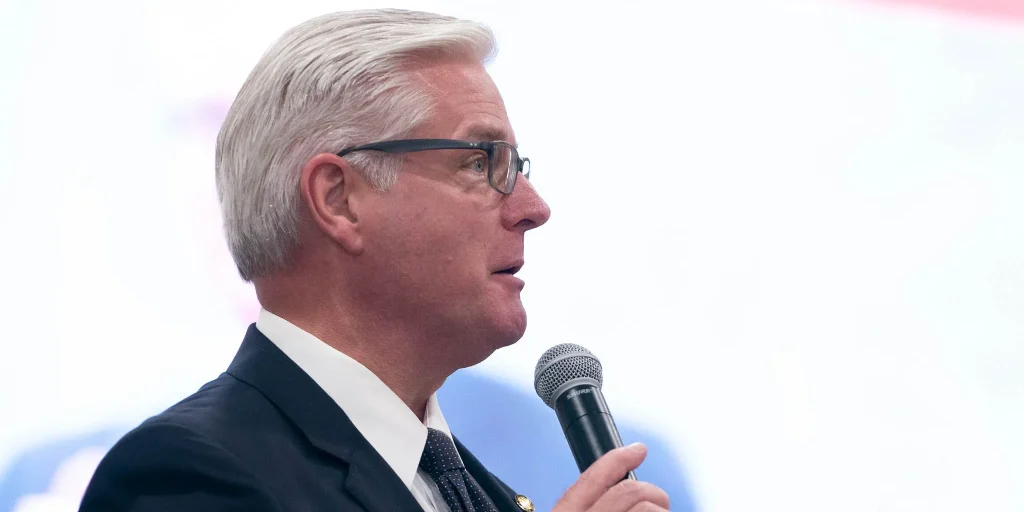On Thursday, Governor Kay Ivey and Lt. Governor Will Ainsworth were joined by all legislative leaders from both the Alabama House and Senate to announce a comprehensive plan to tackle Alabama’s workforce challenges, enhance the state’s economic competitiveness, streamline government, and remove barriers to employment for Alabamians.
The package is entitled Working for Alabama.
It encompasses seven bills to address three core challenges: Workforce development, economic development, and community development.
The starting point for the approach, as identified by Lt. Governor Ainsworth’s 21st Century Workforce Commission, is to get state leaders and agencies on the same page – all working toward the same goal.
“Our state has seen tremendous advances as a result of collaborative, team-driven efforts. Just a few years ago, we were ranked 47th in the nation in broadband access – now, after signing the Connect Alabama Act, we rank 24th. The Game Plan, which was passed last year, gave us the best tools in our region to recruit industry and jobs, and the results are already paying dividends,” Governor Ivey told lawmakers and business leaders on Thursday.
“In 2015 major reforms were made within the state’s workforce development sector, and as governor, I am calling on our Legislature to once again make the needed reforms so that our workforce development programs work better for its two customers – our jobseekers and our employers. ‘Working for Alabama’ is the next big step, and I look forward to seeing the benefits it will have on Alabama for years and decades to come,” Ivey said.
RELATED: Ainsworth envisions Alabama as ‘workforce engine of the Southeast’
Working for Alabama will merge, consolidate, and streamline duplicative workforce development agencies and programs under a central agency, making way for strong collaboration among employers, agencies, and educational institutions.
The Department of Workforce will be led by a Secretary of Labor appointed by and serving at the will of the Governor. The Secretary will be responsible for the administration of the ADW and advise the Governor and the Legislature in matters relating to workforce development.
Ivey was joined by legislative leaders across both chambers and both sides of the aisle in unveiling the plan, which was introduced as seven individual pieces of legislation today. Alabama Senate President Pro Tem Reed said the state needs to streamline its strategies to better compete against other states in economic development and job recruitment.
“Economic development is vital to the future success of our state. The accomplishments of tomorrow will be direct results of the decisions and investments we make today. Alabama has made our priority clear: We not only want the best economic incentives to bring businesses to our state, we also want to make sure the resources and workforce are here to make those businesses flourish,” Reed (R-Jasper) said on Thursday.
https://twitter.com/SenatorGregReed/status/1770844600543883387
“Streamlining, highlighting and regularly upgrading our economic development strategy through this package will continue making Alabama the economic engine of the South.”
RELATED: Reed details legislative approach to building the Alabama workforce of tomorrow in BCA talk
Among the central challenges being addressed in the plan is that almost half of the state’s working-age individuals are neither employed nor seeking to participate in the workforce.
Working for Alabama proposes a historic, transformative change to existing efforts, alongside new initiatives to remove barriers to employment, such as a proposed childcare and housing tax credit, public-private partnerships throughout Alabama’s education system, and a range of economic development tools to enable the state to continue attracting and retaining high-quality employers.
One barrier to employment that has been a key focus of Speaker Ledbetter is the availability of affordable childcare.
“The unfortunate reality is that many Alabamians must choose between raising their children and having a career, and for our state to continue growing, that has to change,” Speaker Ledbetter (R-Rainsville) said on Thursday.
The Working for Alabama package addresses barriers to workforce entry and retention, streamlines our development efforts, and positions Alabama to continue dominating on the national stage.
Alabama is working like never before, and we aren’t slowing down one bit. pic.twitter.com/PQsAVINxe3
— Nathaniel Ledbetter (@RepLedbetter) March 21, 2024
“The childcare tax credit legislation has the power to give parents choices and help them provide better lives for their children. Alabama is not only the most pro-business state in the nation but also the most pro-family state,” Ledbetter said.
RELATED: Legislative leaders discuss ambitious workforce and economic development package
One of the seven bills will create credits to incentivize employers to fund childcare options. It also incentivizes childcare providers, both for-profit and non-profit, to expand access and quality – available for employers that provide on-site childcare or stipends to employees for childcare expenses.
Tax credits would also be available to for-profit childcare providers that voluntarily participate in the state’s child care quality rating program, and donors to nonprofit childcare providers for the improvement or operation of the facilities.
All told, the Working for Alabama legislative proposal is composed of the following bills, being carried by the following sponsors:
- The Alabama Workforce Transformation Act by State Rep. Danny Garrett (R-Trussville), who serves as the Chairman of the House Education Trust Fund Committee and State Sen. Steve Livingston (R-Scottsboro), who serves as the Senate Majority Leader.
- The Workforce Pathways Act by State Sen. Donnie Chesteen (R-Geneva) and Rep. Kelvin Lawrence (D-Hayneville) to establish a Workforce Pathways diploma at the K-12 level and reinvest in Career & Technical Education (CTE) centers across the state.
- The Childcare Tax Credit by State Sen. Garlan Gudger (R-Cullman) and House Minority Leader Anthony Daniels (D-Huntsville) to expand access and quality to childcare for working Alabamians.
- The Workforce Housing Tax Credit by State Sen. Chris Elliott (R-Josephine) and State Rep. Cynthia Almond (R-Tuscaloosa) to create a workforce housing tax credit, complimenting the existing federal housing tax credit program to incentivize private capital investment in the development of affordable workforce housing.
- The Alabama Growth Alliance Act by Senate Pro Tem Greg Reed and State Rep. Randall Shedd (R-Arab) to establish a public-private partnership focused on the state’s long-term economic development and introduce clear benchmarks and pathways for effective growth.
- The Innovation District Act by Senate Minority Leader Bobby Singleton and State Rep. James Lomax (R-Huntsville) would authorize local governments to create a new type of local entity to undertake and incentivize economic development projects in certain business sectors identified by the Alabama Department of Commerce.
- The Innovation District Act would require an amendment to the Alabama Constitution for consideration among the voters of Alabama. Such a CA proposal is being carried by State Sen. Dan Roberts (R-Birmingham) and State Rep. Neil Rafferty (D-Birmingham).
Officials say by consolidating the workforce development functions of the Department of Commerce, the Workforce Development Division, and Department of Labor will engross $370.7 million, earmarked for workforce development by aligning recruitment efforts and merging agencies focused on job placement under one roof.
“You can ask almost any employer in the state, and they’ll tell you that one of the biggest challenges they face is hiring skilled and trained employees,” Lt. Governor Will Ainsworth told state and business leaders on Thursday.
“By eliminating barriers to entry into the workforce, and by making our state’s workforce development efforts more intentional, targeted and efficient, we can create an environment where more Alabamians are working, providing for their families, building careers and contributing to our economy. These transformational changes will make Alabama the workforce engine of the Southeast,” Ainsworth said.
Grayson Everett is the state and political editor for Yellowhammer News. You can follow him on Twitter @Grayson270













